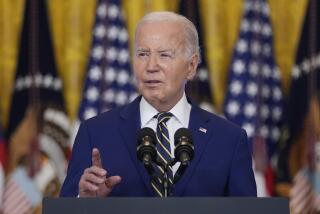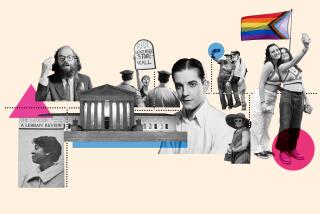Writing an end to the policy of âdonât ask, donât tellâ?
Essay contests donât generally get a lot of mainstream attention. The Secretary of Defense National Security Essay Competition, for example -- whose past winners and finalists have penned papers titled âPlanning Convergenceâ and âNation Building: A Joint Enterpriseâ -- has never made media waves. Until this year: âThe Efficacy of Donât Ask, Donât Tell,â the winning entry, is a breakout hit.
Written by Col. Om Prakash while he was student at the National War College (he is now at the Pentagon), the essay offers a forceful rebuke of the 16-year-old policy. It claims there is no evidence openly gay soldiers negatively affect unit performance or morale and concludes that âit is not time for the administration to reexamine the issue; rather, it is time for the administration to examine how to implement the repeal of the ban.â
The essay, published in Joint Forces Quarterly, a scholarly journal published by the National Defense University Press, was reviewed by Adm. Michael G. Mullen, the chairman of the Joint Chiefs of Staff and the nationâs highest military officer, before publication.
Prakash devotes a considerable amount of thought to the concept of âunit cohesion,â a term defined by Congress as âthe bonds of trust among individual service members that make the combat effectiveness of a military unit greater than the sum of the combat effectiveness of the individual unit members.â
Pointing out that countries such as Australia, Britain, Canada and Israel, which have lifted bans on gays in the military, have seen âno impact on military performance, readiness, cohesion or ability to recruit or retain,â Prakash writes that the âdonât ask, donât tellâ policy âforces a compromise in integrityâ that is ultimately âdamaging to the unit cohesion its stated purpose is to preserve.â
The views expressed in Joint Forces Quarterly do not necessarily reflect those of the Defense Department, but policy experts and pundits are seeing the attention paid to Prakashâs essay as the latest harbinger of major political change on the issue. Gabriel Winant of Salon.com pointed out that Lt. Daniel Choi, an Arabic linguist who was discharged from the National Guard earlier this year after announcing he was gay during a TV interview, has been invited to speak at his alma mater, West Point. Nathaniel Frank, author of âUnfriendly Fire: How the Gay Ban Undermines the Military and Weakens Americaâ and a senior research fellow at UC Santa Barbaraâs Palm Center, calls the Prakash paper a watershed.
âThe Joint Forces article doesnât mean that Mullen and the military are prepared to repeal overnight,â Frank told me. âBut it does represent a notable contrast from the tone we were seeing even a year ago. In my experience talking to countless people in the military, Iâve found that the people who excel are the people who are prepared. And what weâre seeing may reflect a form of preparation for the tasks the military faces.â
Prakash points to a 2006 Zogby poll that found that even though 37% of service personnel in Iraq and Afghanistan disagreed with a repeal of âdonât ask, donât tellâ, 45% reported that they suspected they were serving alongside a homosexual and 23% said they were certain of it (of that 23%, 59% were certain because the person had told them directly). Such reports, Prakash indicates, suggest there is already a tacit acceptance of gay troops, although he also admits that the military has hurdles to overcome if it switches to open acceptance.
Beyond its support for the cause of repealing âdonât ask, donât tell,â the article provides chapter and verse against the general argument that gay rights and gay people diminish heterosexual rights and people. Its straightforward assessment of unit cohesion -- complete with explorations of âtask cohesionâ and âsocial cohesionâ and which is more important to military success (itâs task cohesion) -- is all but a primer on how âlack of unit cohesionâ has become code for something else: namely, old-fashioned bigotry.
It seems clear that the idea that gay people pose a threat to the social fabric -- another way of saying âunit cohesionâ -- is not going to disappear tomorrow, nor will it probably ever go away entirely.
For a while, it looked like it would get its biggest push toward oblivion in the domestic realm, with the acceptance of gay marriage, but perhaps it will be the issue of gays in the military that reaches the tipping point first. In any case, that adage about everything being fair in love and war may soon take on a greater resonance -- on the battlefield if not yet at the altar.
More to Read
Sign up for Essential California
The most important California stories and recommendations in your inbox every morning.
You may occasionally receive promotional content from the Los Angeles Times.











